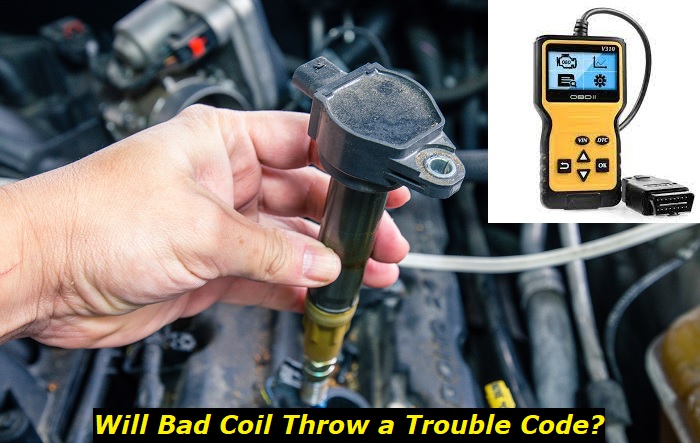Have you ever heard of a coil pack? It's an important part of a car's engine, responsible for producing the spark that ignites the fuel and air mixture. But what happens when your coil pack isn't functioning correctly? Will it throw a code? What are the common symptoms? Read on to find out more about bad coil packs - including why they fail, what codes they can throw, and how to troubleshoot them.
P0300 code highlights
- Level of urgency:Medium
- Possible culprits:Bad plugs, bad coils, issues with fuel supply, air supply problems
- Price for repair:$100 - $550
- If neglected:Loss of power, harsh work, inefficient fuel consumption, vibrations
- DIY repairs:Possible but complicated
- Can you drive?Yes

What is a coil pack?
A coil pack is an electronic ignition system used in cars to provide the necessary spark for combustion to take place. The coil pack consists of individual coils, each responsible for firing a spark plug in turn, which generates high-voltage pulses. Coil packs are more efficient and powerful than traditional distributors.
They allow for improved fuel efficiency and better engine performance due to them providing a stronger ignition spark; this results in cleaner and more complete burns within cylinders. Additionally, coil packs are relatively easy to maintain as they don't require simple replacement or re-adjustment of parts like other components do.
Furthermore, they also use less energy compared to distributor models, thus, leading to improved overall emissions. All of these advantages combine together, creating an efficient device which both produces reliable power and significantly lowers emissions.
How and why do bad coil packs occur?
A bad coil pack can occur for a variety of reasons, such as an excessively hot environment, excessive vibrations, or faulty wiring. In most cases, a bad coil pack will cause the engine to misfire and may result in the "Check Engine" light being illuminated.
Such misfires occur when the spark plug is not getting enough voltage; as a result, this issue causes the unburned fuel to go out through the exhaust system instead of being burned in the combustion chamber. This can lead to poor fuel economy and increased emissions output.
Additionally, if a coil pack fails entirely, it can be responsible for causing premature wear on other parts of the engine, such as pistons and valves. It is important to have any issues with your coil packs checked out by a trusted mechanic as soon as possible in order to ensure optimal performance from your vehicle.
Will a bad coil pack throw a code?
When a coil pack has become faulty, it can cause a wide range of issues for a vehicle. These typically include misfiring and rough idling, along with decreased power and torque. In more severe cases, the bad coil pack may cause left or right stalling in one or more cylinders. If the damage caused by the faulty coil pack is significant enough, its effects will be registered as a code by the onboard computer system.
This code will appear when diagnostics tests are performed using an OBD-II scanner. A bad coil pack can throw a wide variety of codes, ranging from P0300 (random misfire) to P0304 (cylinder 4 misfire) and beyond. The information received from this scan allows mechanics to identify what components should be repaired or replaced in order to restore full vehicle performance.
What are the common symptoms of a bad coil pack?
1) Engine misfires
A bad coil pack can often cause an engine misfire, which is one of the most widespread symptoms associated with this type of issue. Malfunctioning or damaged coil packs can lead to a decrease in spark energy, which will, in turn, cause reduced fuel delivery and misfires.
This can be identified through an engine diagnostic scan, as it will highlight any faults in the ignition system. However, other symptoms may also be present, such as poor acceleration, stalling, or difficulty starting the engine. The underlying problem needs to be addressed before further damage is done, and a qualified technician should be consulted for proper diagnosis and repair.
2) Difficulty starting the car
Starting a car can be difficult for various reasons, and one of them is a bad coil pack. This can manifest itself in a few different ways: the engine may not turn over at all, or it may take several tries before it starts up. Additionally, the car may make strange noises when attempting to start it, such as loud clicking or weird buzzing sounds.
Lastly, there is also the possibility that the car will start fine but run rough afterwards - this could be due to an incorrect firing order in the cylinders caused by the faulty coil pack. In all these cases, replacing the coil pack should solve the issue and restore the proper operation of your vehicle.
3) Decrease in power and acceleration
Decreasing power and acceleration are two of the most widespread symptoms of a failing coil pack. When the electric current flowing through the ignition coils is inadequate, the spark plugs do not receive enough electricity to ignite combustible mixtures. This leads to decreasing power and acceleration as the engine struggles to keep up with normal performance expectations.
4) Stalling
Stalling is a commonly-seen symptom of a faulty coil pack. This is often caused by voltage loss that results from connections between the ignition coil and the spark plugs becoming damaged. The resulting electrical issue causes an interruption to the energy in the combustion chamber, making the engine stall abruptly.
Furthermore, a faulty coil pack can also lead to inefficient fuel distribution and the misfiring of spark plugs, which will cause further stalling issues. Because stalling can be indicative of other underlying issues, it's important to properly diagnose what's causing it before attempting any repairs or replacements. Fortunately, with proper diagnosis and maintenance, stalling due to a bad coil pack can usually be prevented or resolved relatively quickly.
5) Increased emissions
Increased emissions can have many causes, but a bad coil pack is one of the most common. A malfunctioning coil pack will cause increased levels of unburned fuel to be expelled through the exhaust, resulting in increased emission levels. It is important for car owners to get their vehicles serviced regularly and take note of any warning signs that their engine is not running as efficiently as it should, such as unusually high emissions or difficulty starting the engine.
6) Poor fuel economy
Poor fuel economy is a typical symptom of a malfunctioning coil pack, yet one that is often overlooked. As explained above, faulty coils can cause the engine to misfire and run inefficiently, resulting in decreased power output and fewer miles per gallon (MPG). This type of misfiring can be caused by loose connections, cracked or broken insulation, or worn-out spark plugs.
An improper spark timing due to defective spark plug wires can further reduce engine efficiency and performance while significantly increasing fuel consumption. Ultimately, neglecting to identify and replace a bad coil pack can result in costly repairs down the line; thus, it is important for vehicle owners to pay attention to signs of diminished performance and lower-than-usual MPG.
How to troubleshoot a bad coil pack?
Troubleshooting a bad coil pack requires careful and methodical investigation, as the cause of the issues can vary. First, check if there is any visible damage, such as frayed wires or cracks in the insulation. If no damage is readily apparent, then it's time to start testing each individual coil pack against the manufacturer's specifications.
This should include checking for proper resistance readings and verifying that each spark plug is correctly sealing. If all of these tests are passed successfully, yet the problem persists, consider replacing the entire unit with an original equipment manufacturer (OEM) replacement part.
Doing so will ensure that all components meet the exact specifications set out by the vehicle's manufacturer and will help avoid any further complications down the road.
Conclusion
It's clear that a malfunctioning coil pack can have serious implications for the functionality of your car. However, the key to addressing any issues is to be able to identify the symptoms of a bad coil pack and distinguish them from other potential problems.
By recognizing these symptoms early and understanding that they could potentially indicate a faulty coil pack, it's possible to ensure your car remains in good condition and avoid more costly repairs in the long run.
Have you ever had problems with a bad coil pack/ Let us know in the comments below!
About the authors
The CarAraC research team is composed of seasoned auto mechanics and automotive industry professionals, including individuals with advanced degrees and certifications in their field. Our team members boast prestigious credentials, reflecting their extensive knowledge and skills. These qualifications include: IMI: Institute of the Motor Industry, ASE-Certified Master Automobile Technicians; Coventry University, Graduate of MA in Automotive Journalism; Politecnico di Torino, Italy, MS Automotive Engineering; Ss. Cyril and Methodius University in Skopje, Mechanical University in Skopje; TOC Automotive College; DHA Suffa University, Department of Mechanical Engineering






Add comment